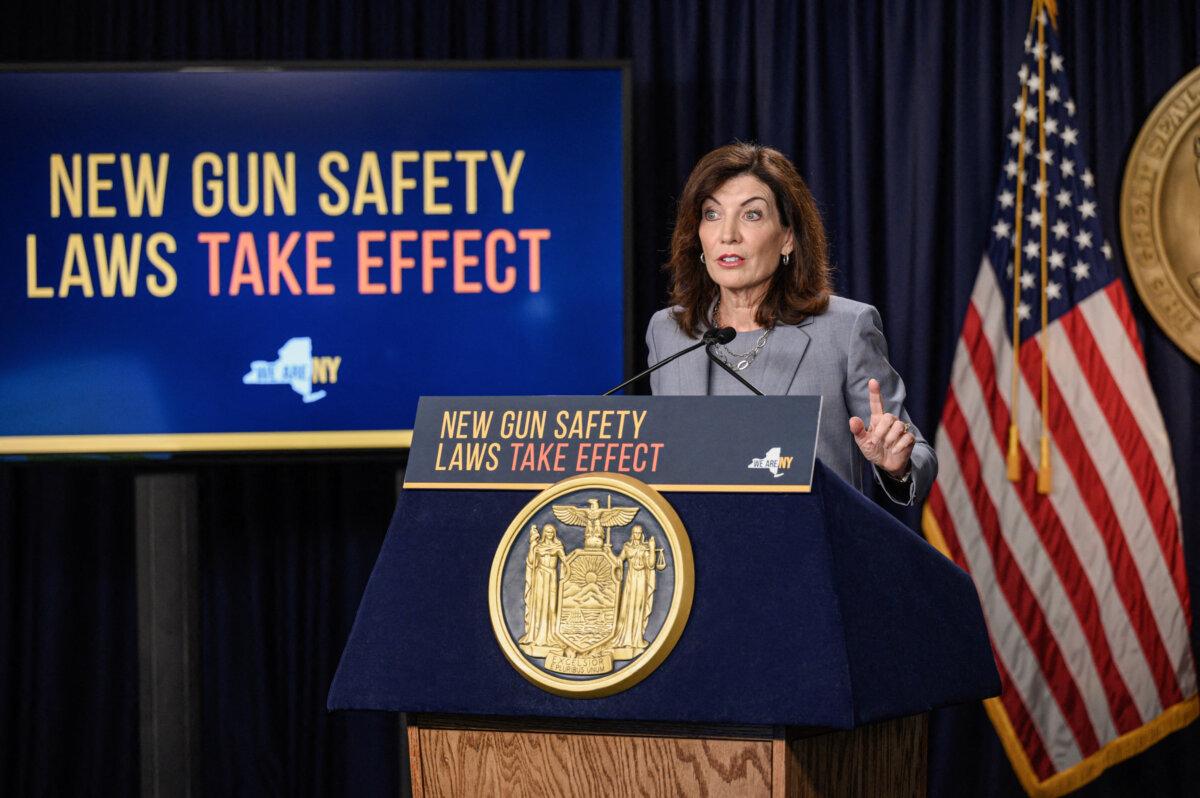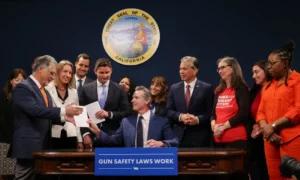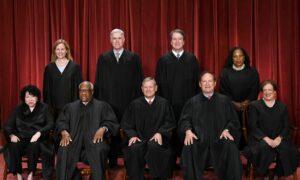Gun rights advocates say an all-or-nothing attitude from gun control proponents shuts down conversation almost before it begins.
The Second Amendment debate has become increasingly partisan, making consensus seem almost impossible.
Gun rights advocates told The Epoch Times that an all-or-nothing attitude from gun control proponents shuts down conversation almost before it begins.
“They don’t care if (a proposed law) is constitutional; they will acknowledge that it isn’t,” Nephi Cole, the National Shooting Sports Foundation’s (NSSF) Director of Government Relations, State Affairs in the Rocky Mountain Region, told an NSSF gathering in Las Vegas, Nevada, Jan. 23.
“That is frightening to me, and it ought to be frightening to all of us.”
Mr. Cole was part of a panel of NSSF Directors of Government Relations for State Affairs during the NSSF’s Shooting, Hunting, Outdoors, Trade (SHOT) Show. He was joined by Michael Findlay, who covers the West Coast; Darren LaSorte of the South-Central region; Chris Lee, Midwest; and Jake McGuigan, NSSF’s Managing Director of Government Relations, State Affairs, who also oversees the Northeast.
Mr. McGuigan said that what should be a dialog on preserving a constitutional right and protecting public safety has become a partisan fight.
Mr. LaSorte agreed.
“I worked in Tennessee back in the early 2000s, and the Democrats controlled both houses by big majorities, and it was one of the most pro-gun states in the in the country. Things have changed dramatically,” Mr. LaSorte told the gathering. “That was 20 years ago. It’s very, very difficult to find a blue dog Democrat who supports the Second Amendment.”
He and the other panelists noted that as Democrats take control of more state legislatures and municipal offices, they become more intransigent on the issue.
That left 16 states under Democratic control and 10 divided states. The NCSL labeled a state divided if one party controlled the legislature and the other held the governor’s office.
The state of Nebraska has the country’s only unicameral legislature. Legislative elections there are non-partisan, so the NCSL did not count it. However, the gun control fight is playing out in the Corn Husker state just as it is around the nation.
“We don’t want it to turn into a partisan debate. But unfortunately, that’s what we’re facing,” Mr. McGuigan said.
Gun rights proponents celebrated the U.S. Supreme Court cases New York State Rifle and Pistol Association v. Bruen and District of Columbia v. Heller as landmark decisions.
In Heller, the court clarified that the Second Amendment protects individual rights and that forcing citizens to keep guns unloaded and inaccessible in their homes violated the Second Amendment.
The Bruen further solidified the Second Amendment as an individual right and set a historical and traditional standard for any new gun law. Under that test, proposed laws would have to fit the plain reading of the Second Amendment and demonstrate a tradition of similar gun control laws in American history.

For Second Amendment advocates, the rulings heralded a new era for American gun rights. However, gun control activists redoubled their efforts to implement gun control.
California, Oregon, Illinois, Washington, and other blue state legislatures defied the rulings and implemented more and stricter gun laws or refitted existing laws to the new standard.
Washington, Illinois, and Delaware joined the seven other states in banning certain types of semi-automatic rifles, so-called “assault weapons.”
Many states expanded their lists of “sensitive places” where carrying a firearm was prohibited completely. These mainly included places of worship, schools, hospitals, government buildings, and other public spaces.
New York, California, and Illinois have led the way, passing various bans and concealed carry laws, some of which had been ruled unconstitutional in other states previously. New York’s reaction to Bruen was the Concealed Carry Improvement Act (CCIA), announced on Aug. 31, 2022.
The CCIA raised the license training requirements, lengthened the list of places where concealed carry was prohibited, required in-person interviews and a review of an applicant’s social media accounts mandatory, and reduced the license recertification period from five years to three years.
California enacted SB 2, a law that expanded the list of places where concealed carry of a weapon was prohibited so much that a judge overseeing a lawsuit against the bill said it basically put the whole state off limits. Along with SB 2, California passed laws banning certain types of firearms and accessories, including so-called high-capacity magazines, along with outlawing gun shows on public property.
The state of Illinois instituted a so-called “assault weapons” ban on certain semiautomatic rifles under the “Protecting Illinois Communities Act.” The Act also raised the age to obtain a Firearms Owner Identification Card to 21 and requires registration of certain firearms that have been grandfathered under the law.

All three states, as well as others that have passed gun laws, have been sued. The U.S. Supreme Court recently heard arguments in a Texas case concerning extreme risk protection orders, or “red flag” laws, and will hear a case on whether a government agency can ban certain firearm accessories. The high court will also hear a case on whether New York officials abused their authority by pressuring financial institutions to end their business relationships with the National Rifle Association.
In Nebraska, the fight is between the state and some of its cities.
Last April 25, Nebraska Gov. Jim Pillen signed LB 77 into law. This legalized the permitless carry of a pistol in the state and also repealed all local firearms ordinances or regulations. But officials in Lincoln and Omaha were unmoved by the new law.
They issued their own restrictions on carrying guns despite the fact that under the law’s preemption language, the state law supersedes local ordinances.
The Liberty Justice Center, a non-profit, public interest litigation firm, sued Omaha and Lincoln over their refusal to comply with the new state law. Liberty Justice Center attorneys have expressed confidence that they will be successful in court, but the NSSF panelists say that winning isn’t necessarily the point.
It’s about bleeding the opposition.
“They don’t care about lawsuits. It’s death by 1,000 cuts,” Mr. McGuigan said.
Unlimited Resources
They pointed out that the government entities passing the anti-gun laws are taxpayer-funded and have almost unlimited resources. At the same time, the pro-Second Amendment groups are privately funded.
Mr. Cole predicted there would be a trend of more and more state-level gun restrictions. He said that pushing legislation through the U.S. Congress can take years because of the legislative process and the bureaucracy.
However, a state legislature under the control of one party sending bills to a governor from the same party can be much nimbler. This means that literally dozens of bills can be signed into law and will remain the law unless Second Amendment proponents respond.
“A bill can be introduced today, and in a month, it’s the law. That’s how fast we have to respond. It is not a systematic process. It’s a process that can happen in a week,” Mr. Cole said.
Original News Source Link – Epoch Times
Running For Office? Conservative Campaign Consulting – Election Day Strategies!


